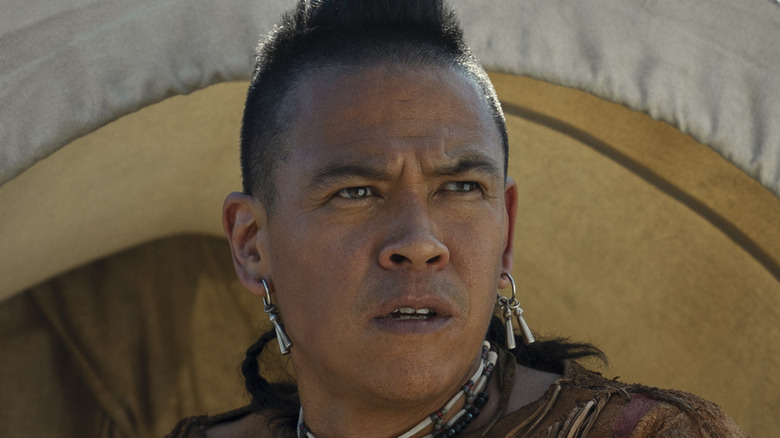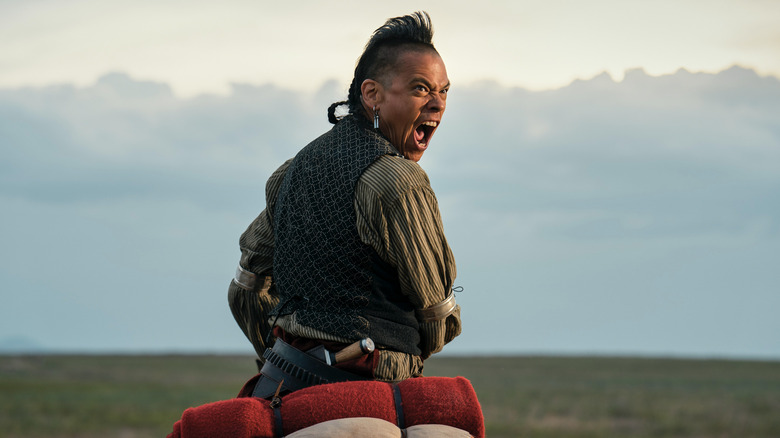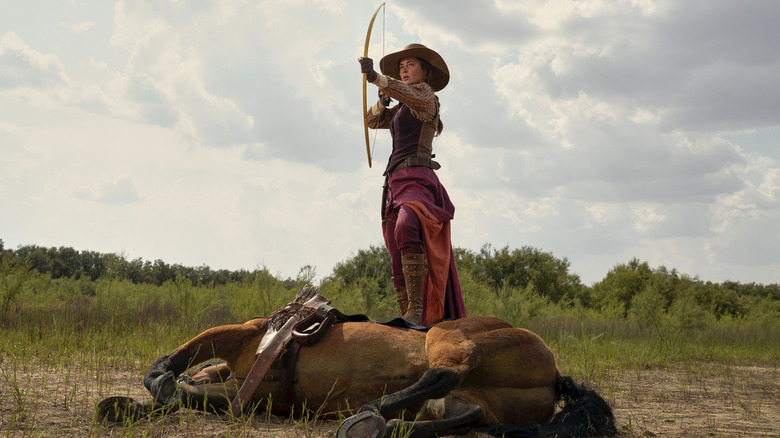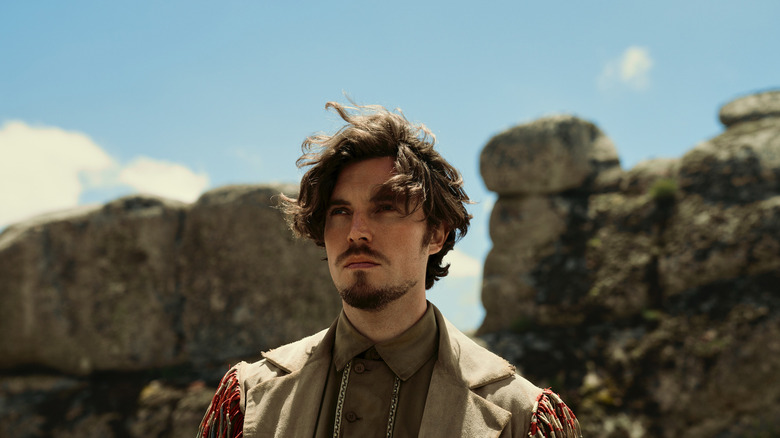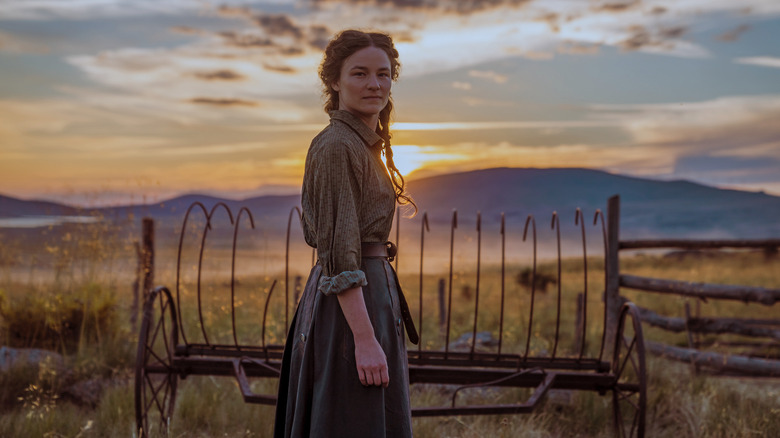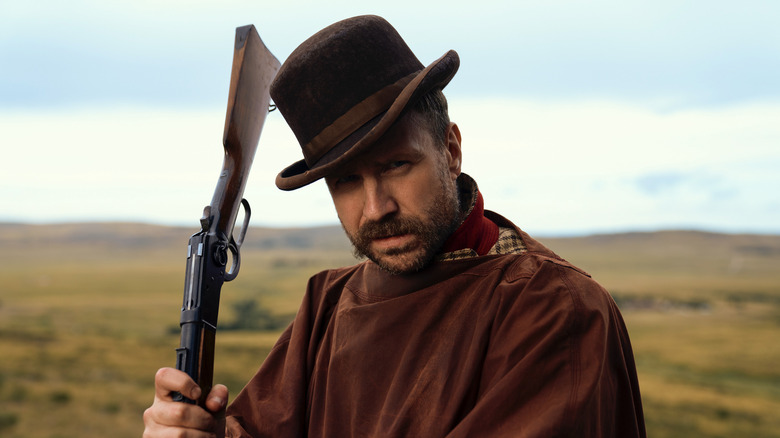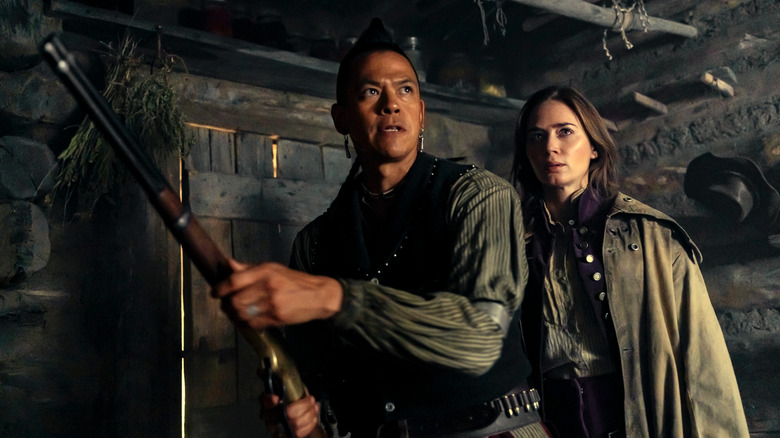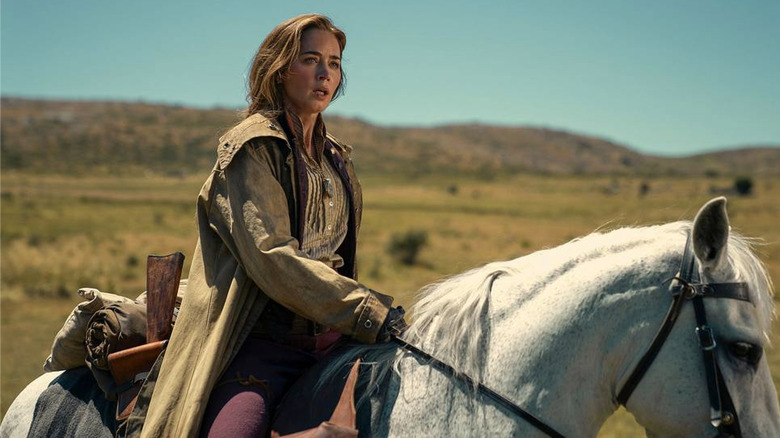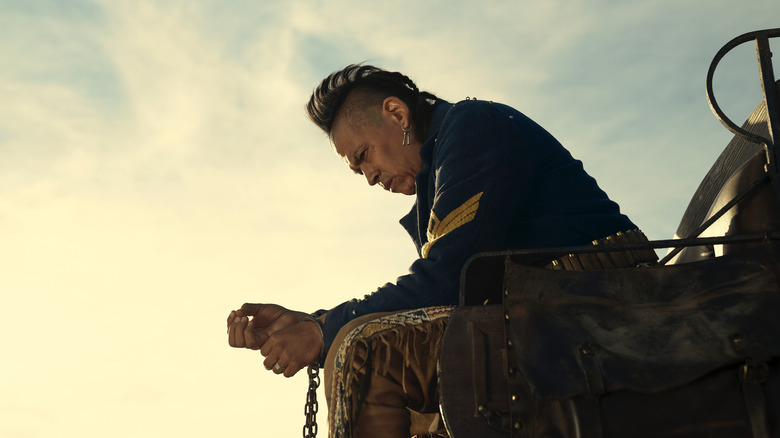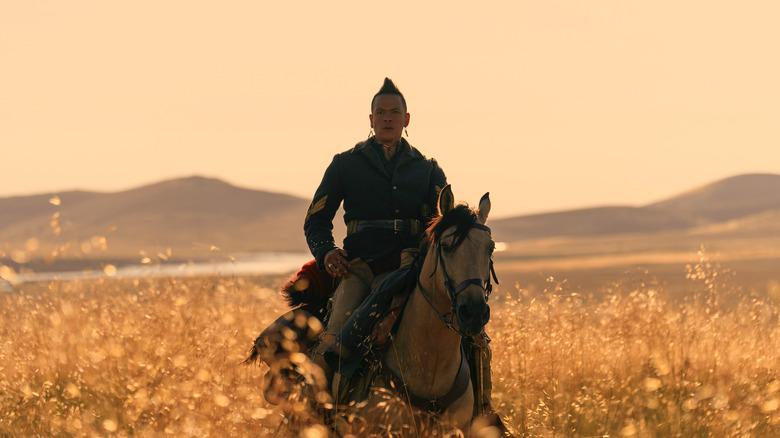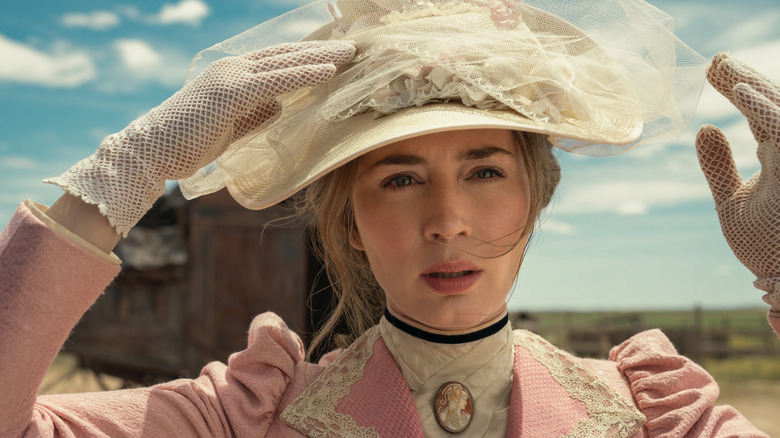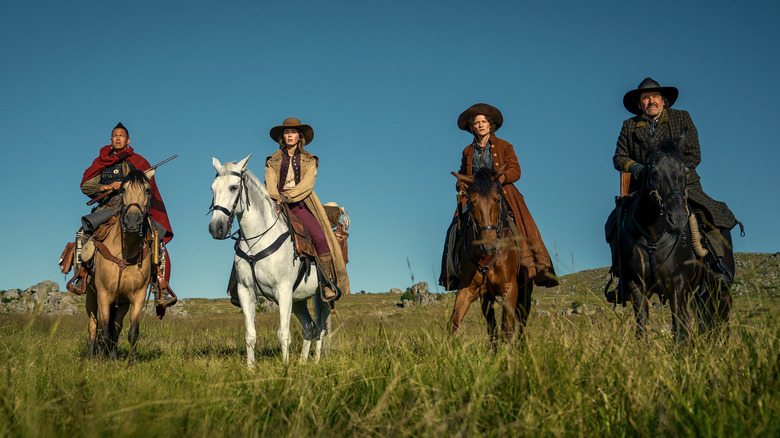The Ending Of The English Explained
Hugo Blick, the writer and director of the new BBC Two and Amazon Western limited series "The English," has made a name for himself writing political thrillers and international crime dramas. His experience crafting clever twists and surprising mysteries is on full display in "The English" as well, where every one of the six episodes revealed new secrets about the main characters.
"The English" bends genre in many ways. Is it a thriller? A Western? A revenge flick? A serious drama about grief and confronting the past? Honestly, it's all of the above — a series that masterfully exposes unexpected secrets in each chapter. These reveals feel organic, as if the camera has slowly panned back to allow the audience to see the complete picture suddenly. Is it perfect? No, some of the dialogue feels a bit overly sentimental, and we have thoughts about that ending. But is it the best mystery drama of 2022? Possibly, and the critics agree.
The story follows Cornelia Locke (Emily Blunt), a wealthy Englishwoman traveling through the American West during the 1890s, where she meets a Pawnee scout named Eli Whipp (Chaske Spencer) who's recently left the U.S. army. The unlikely pair travel through a bleak, surrealist Western landscape, encountering characters who often feel as if they belong in a horror anthology. Indeed, at times, "The English" portrays the American West as a gruesome house of horrors that our main characters must survive. With so many twists and turns in the series, there's plenty to unpack in its ending.
The complicated story of Eli Whipp
The hero of "The English" is Eli Whipp (Chaske Spencer), a Pawnee scout formerly of the U.S. Army, and a man of many contradictions. He lost everything — his family, his tribe, and his home — all due to the relentless evil of Manifest Destiny. However, he still joins up with the U.S. Army, though it's never clear whether he's conscripted or a volunteer. Even when Cornelia questions him, he gives a cryptic answer. Once a scout, Eli becomes a part of the machine that destroyed his own people. For those on the frontier, Eli Whipp is a war hero, a soldier of great reputation who even commands his fellow white officers at times.
Now that he's left the great overwhelming force that is the military, he grapples with his demoted place on the frontier and the consequences of choosing to aid the Army in its campaigns. On more than one occasion, Eli removes himself from the responsibility of a situation, claiming it's "Not my business." In a conversation with John Clarke (Gary Farmer), Eli accuses him of being nothing more than a parasite, "Sucking 'til you pop." Clarke retorts, "Says a man who got his coin from the U.S. army."
In the end, though, Eli admits his guilt in the massacre at Chalk River, acknowledging he was there and did nothing to stop it. Almost as an act of contrition, he stabs Melmont (Rafe Spell) and tells Sheriff Marshall (Stephen Rea) to arrest him, taking on full responsibility for his death.
The hidden depths of Cornelia Locke
In "The English," Emily Blunt stars as Cornelia Locke, an Englishwoman who comes to America looking for revenge on the man she feels is responsible for her son's death. But her mission is so much more than that. Cornelia is a surprising mix of shaky vulnerability (hiding her face at death scenes) and raging violence (that scene with Black Eyed Mog comes to mind).
She's the one who stabs Katie Clark (Kimberly Guerrero) and threatens John Clarke when he betrays Eli. While she demands John give her Eli's location, the camera pans up from her to where she sits with a rifle across her knees — a classic Western image. Cornelia has become the anti-hero gunslinger of the West. And yet, she claims that "It's magic" that led her and Eli together, that it "was written in the stars." The revelation that she has syphilis, and that her son suffered with it his whole short life, is shocking.
Despite all this, Cornelia deserved a better ending. The love she and Eli feel for each other is tragic and beautiful — a Romeo and Juliet kind of affair. So why couldn't Cornelia run away with him in the end? Why, instead, does she move back to England — a place that never felt like home for her — to live a life of loneliness and isolation? Sadly, Cornelia's ending does the character a disservice. She's proud, fierce, and surprisingly optimistic, and her dispirited, quiet ending just doesn't feel like enough.
An evil good guy
Thomas Trafford (Tom Hughes) is an Englishman living in America and working a cattle ranch in Wyoming. At the beginning of "The English," we learn that someone has been terrorizing Trafford's livestock by gruesomely killing off pregnant cows. However, he feels he deserves this for his role in the Chalk River massacre, although he did try to prevent it as much as he could. He dies at the end by his own hand, cutting the rope his cowboys throw him when he's caught in a flood.
Unfortunately, Trafford is the one character in "The English" whose arc doesn't feel as complete as the rest. He starts out a proper villain with the violent punishment of a nightwatchman (in cricket whites, no less). Yet, his is such a startling transformation, from wealthy "Bond" villain to guilt-ridden gentle soul, that it feels as if Blick were trying to play a trick on his audience. We're presented with an obvious bad guy whose character then completely changes. Make no mistake, the reveal that Melmont is the series' true villain is brilliant. However, Trafford's arc could definitely have been executed a bit more smoothly.
If you or anyone you know is having suicidal thoughts, please call the National Suicide Prevention Lifeline by dialing 988 or by calling 1-800-273-TALK (8255).
A character no one saw coming
One of the great joys of watching "The English" is how side characters who don't seem relevant to the overall story suddenly explode on screen, threatening to dominate the narrative. Martha Myers (Valerie Pachner) is a perfect example of this.
This independent, stern-seeming woman lives on the frontier with her son Jed (Walt Klink) and the clearly useless Billy Myers. We learn that she's an excellent rider, that Trafford has rustled a few of her cattle, and that her story mirrors Cornelia's, except for two glaring differences: She doesn't have syphilis, and she has no money. As an unwed pregnant woman (Melmont assaulted her as well as Cornelia), she had no options and was traded to Myers by her father. Her life has clearly been one of hardship and pain.
When Jed learns what his biological father did to his mother, the angry teenager races to confront Melmont, rushing at him with a broken saber. To save Jed and get vengeance for what Melmont did to her, Cornelia pulls a gun on him, but she can't pull the trigger. Martha, however, has no such reservations and promptly blows a hole in his chest with her rifle, claiming vengeance for them both.
If you or anyone you know has been a victim of sexual assault, help is available. Visit the Rape, Abuse & Incest National Network website or contact RAINN's National Helpline at 1-800-656-HOPE (4673).
A terrifying villain
The horrifying and disgusting villain of "The English" is David Melmont, another character who comes out of left field to blow apart the audience's preconceptions of who the bad guy really is. Rafe Spall is brilliant in the role, delivering an insidious and deranged performance that's sure to stick with you long after the show ends.
This racist, misogynistic character is a bloodthirsty maniac and rapist who rips through Wyoming (and London) with threatening malice. Naturally, he becomes a wealthy businessman, building stores throughout the area. And of course, he dies at the end because "The English" is fiction, and bad guys are killed by the hero for the purposes of closure.
At the end of the series, clips play of the first Western film ever shot and acknowledgments are made of Buffalo Bill's Wild West Show — all real things. A picture also flashes up of a modern supermarket called "Melmont's: Home of the homemaker." However, there is no store called Melmont's (we looked). Why include this fictional store with all these historically accurate facts? Perhaps as a nod to all the actual businesses in the world today built on exploitive practices.
If you or anyone you know has been a victim of sexual assault, help is available. Visit the Rape, Abuse & Incest National Network website or contact RAINN's National Helpline at 1-800-656-HOPE (4673).
The English definitely wants revenge
It's clear from the first five minutes of "The English" that revenge is one of the show's main themes. When we meet Eli, he's just wrapped up his military service after witnessing (and possibly participating in) a revenge-killing of a Native American man called Killing Hawk. According to the soldiers who kill him, this is justice for their friend Lonnie, who they say Killing Hawk murdered years before. However, by the end of "The English," it's evident that this revenge trek is unwarranted.
Cornelia comes to America similarly bent on revenge. She's tracked down Melmont to Wyoming, desperate to kill the man responsible for her son's death before she dies. Are these two types of revenge different? Is one a moral act of justice and the other just a horrific murder? For better or worse, this thread of violent revenge isn't fully developed or resolved in "The English." It's largely left up to the audience to draw the lines between righteousness and senseless violence, but some characters feel particularly worthy of retribution.
Cornelia Locke's guiding force is motherhood
When Cornelia and Eli come upon a Mennonite wagon where the parents of an infant and a little girl have been killed, the two do everything they can to save the children. Both Eli and Cornelia are grieving parents. Cornelia holds the baby but seems uncomfortable and tries to hand the child back to Eli, who looks up at her confused. "You don't want it?" he asks, sparking a conversation between the pair where Cornelia reveals that she's been a mother, that she is still a mother, but that she can't be a mother again. Obviously, this is related to her syphilis diagnosis, as we discover later.
But Cornelia is a mother through and through. She sets off on her own to take the children back to their Mennonite relatives, risking her own safety to do so. Then she rescues White Moon (Forrest Goodluck), who she dubs "No Trouble" because that's what he is. During the showdown between Melmont, Eli, and Cornelia, she tells Melmont that she loved their son "because he breathed. Because I was his mother."
It's also worth pointing out that the ending of "The English" is resolved by two raging mothers desperate to protect and avenge their children. Indeed, in the Myers' cabin, when the two women realize they have a shared history, there's a fantastic moment of connection between them. And, of course, Touching Ground (Tonantzin Carmelo) gives her life to protect her son White Moon, another example of, as Flathead Jackson puts it, "a mother's love."
The English attempts to grapple with colonialism
The Western, as a genre, is tricky. For many movie-goers, it embodies a mythic place in the American cinema canon, representing classic Hollywood films and encapsulating the idea of the frontier that drove so much of American history. It's also a genre that's exploited the dark genocidal past of America and instigated many problematic portrayals of Native Americans. "The English" can't solve that, but it does reckon with it a little.
Colonialism and the theft of American lands from indigenous tribes are central to "The English." When Eli and Cornelia go to a nearby fort looking for White Moon, they discover that his mother, Touching Ground, has been forced into a school for Native Americans designed to convert them to Christianity, teach them English, and force them into servitude. According to the racist Major MacKay (Stuart Milligan), this is the "American Dream." He justifies his actions by turning to Cornelia and accusing her, the English, of doing the same thing to the Irish and the Scots.
Creator Hugo Blick told Televisual that the limited series "couldn't star a Native American playing a Native American if it didn't engage, to some degree, with the genre's historical relationship to race." To bring respectful authenticity to the project, all of the scripts for "The English" were sent to IllumiNative, self-described as "a Native woman-led racial and social justice organization," to ensure that the representation of Native Americans throughout "The English" was accurate and appropriate.
How does Spenser feel about his role?
Chaske Spencer is a revelation as Eli Whipp, delivering a staggering performance that's easily deserving of an Emmy. In the role, Spencer is a classic, taciturn anti-hero. Grief and loss are bound up in his backstory, and despite his claims that he seeks neither pity nor vengeance for what happened to him, there are flashes of anger that spill out. In an interview with Bonnie Laufer, writer and director Hugo Blick revealed that he wanted to make Eli's dialogue as sparse as possible to focus on Spencer's non-verbal performance, allowing him to become "the archetype of the cinematic hero."
For Spencer, playing Eli as a veteran was key since he's seen as a "war hero" by many of the characters in the show. In the same interview with Bonnie Laufer, he talked about preparing for the role by spending time with Vietnam and Iraq war veterans, trying to get a feel for their experiences. Spencer's angle on the character was as "an ex-Vietnam vet biker," the actor told Newsweek. "That's who he is, that's who that guy is, and even though he's from the 1800s, you can still modernize that, and it helped me out a lot."
Spencer had strong opinions about portraying a Native American character, telling Newsweek that "I don't represent all Native America, I'm just an actor [and] they're my experiences, I find that, you know, each Native American has their own different experience and I find that I have my own unique experience. I put that into Eli because I feel like I share with him, the character, being an outsider."
Emily Blunt really connected with her character
When the time came for casting "The English," Hugo Blick knew exactly who he wanted for Cornelia -– Emily Blunt. In fact, Blick wrote the part with Blunt in mind (per Televisual). Luckily, Blunt joined the project right after reading the original script Blick had created. She loved the script so much that the project became her first credit as a producer. "I adore the development of stuff, Blunt told Entertainment Weekly. "I love post-production. I love all of it. I just haven't really asked for the role before." Blunt also told EW that Cornelia felt like a part of her, relevant today despite the character's antiquated setting. "I approached her in quite a modern way," she said. "She just happened to be in a corset or wear a bonnet for some of it."
Because of the long production process (both actors already had their scripts before COVID-19 hit), Blunt and Chaske Spencer became friends — going out to dinner, discussing the series, and allowing their characters' relationship to grow naturally. According to Blick, the easy friendship between the two actors made the filming experience a joy. "It made my job unbelievably easy because all I had to do was work out where to put the camera and get the hell out of the way," the director told Bonnie Laufer. "They would do it in one or two takes, three tops, and we would move on because their relationship was so charismatic."
Hugo Blick felt personally connected to The English
At the age of 18, Hugo Blick, an Englishman, was sent to Montana as a corrective — a journey to straighten his life out. While living in Montana, Blick had an experience that would later become the beginning of "The English." He told Televisual about a hunting partner he had who Blick referred to as Chief. "He wasn't a chief. He called me English. We were easy with this casual racism, but pretty soon I got to see it was a one-way street –- with all the heavy traffic heading his way. Then one day he took off. I never knew his real name, nor he mine. I regretted that."
While the beginning of "The English" might have grown from an experience Blick now views with regret, the ending of the series is all about love. It's a majestic, tragic, and tender love story about two people from completely different cultures, yet brought together by grief and loneliness. And yes, even revenge. According to Blick, "for all the guns and whistles that these kinds of genres attach, the real purpose of 'The English' is that [sic] intimate tender moments of a love affair that develops between these two characters," he said in an interview with Bonnie Laufer. It's this powerful emotional resonance that makes the ending of "The English," and the story leading up to it, so captivating to watch.
